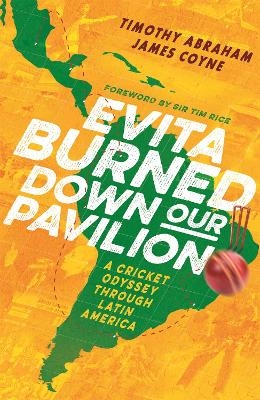
Evita Burned Down Our Pavilion
Constable (Verlag)
978-1-4721-3252-9 (ISBN)
'A highly entertaining read, deftly melding social history with sporting memoir and travelogue' Mail on Sunday
A history of Latin America through cricket
Cricket was the first sport played in almost every country of the Americas - earlier than football, rugby or baseball. In 1877, when England and Australia played the inaugural Test match at the MCG, Uruguay and Argentina were already ten years into their derby played across the River Plate.
The visionary cricket historian Rowland Bowen said that, during the highpoint of cricket in South America between the two World Wars, the continent could have provided the next Test nation. In Buenos Aires, where British engineers, merchants and meatpackers flocked to make their fortune, the standard of cricket was high: towering figures like Lord Hawke and Plum Warner took star-studded teams of Test cricketers to South America, only to be beaten by Argentina. A combined Argentine, Brazilian and Chilean team took on the first-class counties in England in 1932. The notion of Brazilians and Mexicans playing T20 at the Maracana or the Azteca today is not as far-fetched as it sounds.
But Evita Burned Down Our Pavilion is also a social history of grit, industry and nation-building in the New World. West Indian fruit workers battled yellow fever and brutal management to carve out cricket fields next to the railway lines in Costa Rica. Cricket was the favoured sport of Chile's Nitrate King. Emperors in Brazil and Mexico used the game to curry favour with Europe. The notorious Pablo Escobar even had a shadowy connection to the game. The fate of cricket in South America was symbolised by Eva Peron ordering the burning down of the Buenos Aires Cricket Club pavilion when the club refused to hand over their premises to her welfare scheme.
Cricket journalists Timothy Abraham and James Coyne take us on a journey to discover this largely untold story of cricket's fate in the world's most colourful continent. Fascinating and surprising, Evita Burned Down Our Pavilion is a valuable addition to cricketing and social history.
Timothy Abraham is a journalist from Liverpool. He has written for many UK newspapers and most frequently for The Times, Independent and Daily Telegraph. A keen cricketer, Timothy secured German citizenship via his father Ingo only to see his hopes of representing the Deutsche Cricket Nationalmannschaft dashed due to lack of ability. It piqued, however, an interest in cricket in more offbeat locations and he has co-edited the Cricket Round the World section of Wisden Cricketers' Almanack since 2012. Not to be confused with the former Sky Sports cricket reporter of the same name, Timothy has also written for The Cricketer magazine and contributed to BBC radio and online coverage of cricket. He took his one, and to date only, hat-trick in El Salvador. James Coyne is the assistant editor of The Cricketer, where he has written for and edited the world's leading cricket magazine since 2016. He was a contributor to The Cricketer Anthology of the Ashes (Allen & Unwin). Before that he was the assistant editor on six editions of Wisden Cricketers' Almanack, and continues to co-edit the Cricket Round the World section alongside Timothy. Inspired by their experiences on several intrepid cricket tours to mainland Europe - arguably James's lasting cricketing legacy will be as the first wicket to fall in a competitive match in Serbia - and a burning interest in Latin America, he embarked on this book. He also plays for his local club in Bedfordshire. He is married to Baiba, and they have a young daughter, Hannah.
| Erscheinungsdatum | 20.10.2021 |
|---|---|
| Zusatzinfo | 16pp plate section |
| Verlagsort | London |
| Sprache | englisch |
| Maße | 156 x 236 mm |
| Gewicht | 760 g |
| Themenwelt | Sachbuch/Ratgeber ► Sport ► Ballsport |
| Weitere Fachgebiete ► Sportwissenschaft | |
| ISBN-10 | 1-4721-3252-1 / 1472132521 |
| ISBN-13 | 978-1-4721-3252-9 / 9781472132529 |
| Zustand | Neuware |
| Haben Sie eine Frage zum Produkt? |
aus dem Bereich


